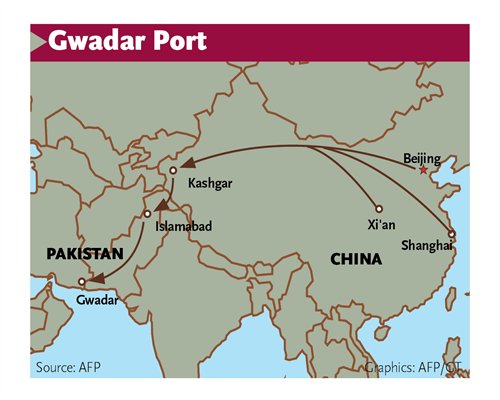
Lack of infrastructure still an obstacle: expert
The strategic Gwadar Port in southwest Pakistan, which will formally commence operations by a Chinese company this month, will be a key transportation hub and a milestone to realize the "One Belt, One Road" initiative, observers said Tuesday.
Gwadar Port, at the gateway of the Strait of Hormuz in the Arabian Sea, will commence operations formally from this month, starting with fisheries exports to Gulf countries, said Dostain Khan Jamaldini, Chairman of Gwadar Port Authority, Pakistan newspaper the Express Tribune reported.
Chinese Overseas Port Holdings Ltd, a subsidiary of China State Construction Engineering Corporation under the State Council, has been granted the right to operate Gwadar for 40 years.
The port is expected to cut over 9,000 kilometers off the distance for oil and gas imports from Africa and the Middle East to China and help boost regional economic growth near Gwadar.
According to Pakistan media, the port authorities have acquired 2,231 acres (902.8 hectares) of land to establish free-trade zones near the port as a large number of international companies have started to establish local businesses.
A 23-year tax holiday for Gwadar has been approved to make the area a commercial hub by attracting investors.
The deep-water port will connect the Silk Road Economic Belt and the 21st Century Maritime Silk Road, and will be a regional hub in the China-Pakistan Economic Corridor, said Lan Jianxue, an associate research fellow with the China Institute of International Studies.
However, obstacles remain, cautioned experts, as the port area suffers from a lack of water resources, housing, transportation and other facilities to provide for a large workforce.
Wang Dehua, an expert with the Shanghai Municipal Center for International Studies, who has been visiting Gwardar Port since 2007, said that detailed plans on building highways, railways and pipelines are the second step. Building such infrastructure has inherent risks and difficulties, he said, due to the high mountain ranges and security issues caused by militants operating in the region, he said. These difficulties can be overcome, but may take time, he cautioned.
The infrastructure is likely to be high on the agenda during President Xi Jinping's upcoming official visit to Pakistan, Wang said.
Chinese foreign ministry spokesperson Hong Lei said in March that Xi will visit Pakistan within the year. It will be Xi's first visit to Pakistan since taking office.
Chinese Foreign Minister Wang Yi, during a visit to Islamabad in February, called the operation of Gwadar and the China-Pakistan Economic Corridor an example for other countries and other projects under the "One Belt, One Road" plan.
The port is to be linked by rail with Kashgar in southwest Xinjiang Uyghur Autonomous Region, which will help West China to open further, observers said.
The port will help Kashgar realize its strategy of becoming a logistics center in Central Asia, a Kashgar official told the Global Times earlier.
Zhao Gancheng, director of South Asia Studies at the Shanghai Institute for International Studies, said the port will serve as a major route to the Indian Ocean for Chinese goods, which will have far-reaching significance for Xinjiang's economic development.
The port will also guarantee China's naval ships' maintenance and supply in the Indian Ocean, Zhao added. The move is widely seen as crucial for China, especially as it is unlikely that Sri Lanka will open its ports to Chinese naval ships, he said.
About half of Chinese goods are exported to the Middle East, Africa and Europe via Indian Ocean routes and oil from the Middle East and Africa is transported back the same way, according to news portal yicai.com.
Indian Ocean safety is of prime interest to China, thus the presence of Chinese naval ships need to be increased, and Gwadar Port holds a key role to accommodate them, Zhao said.
Besides, the social stability in Pakistan is significant for China's frequently unstable border provincial regions like Tibet Autonomous Region and Xinjiang, Zhao noted, explaining that the port is highly projected by the Pakistani government to drive its local economy, which can contribute to its social stability.
















































